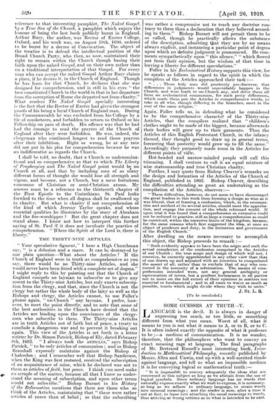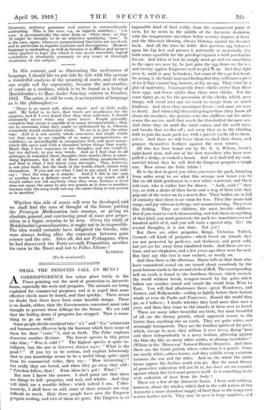SOME GUESSES AT TRUTH—V.
LANGUAGE is the devil. It is always in danger of expressing too much, or too little, or something different from what you mean. Worst of all, what it means to you is not what it means to A, or to B, or to C. It is often indeed exactly the opposite of what it professes to be ;—a medium of communication. It is no wonder, therefore, that the philosophers who want to convey an exact meaning rage at language. The final paragraphs of Mr. Bertrand Russell's most interesting book, Intro- duction to Mathematical Philosophy, recently published by Messrs. Allen and Unwin, end up with a well-merited tirade against language, and tell us what an impossible medium it is for conveying logical or mathematical truth:— " It is impossible to convey adequately the ideas that are concerned in this subject so long as we abstain from the use of logical symbols. Since ordinary language has no words that naturally express exactly what we wish to express, it is necessary. so long as we adhere to ordinary language, to strain word.s. into unusual meanings ; and the reader is sure, after a time it not at first, to lapse into attaching the usual meanings to words, thus arriving at wrong notions as to what is intended to be Sall
Moreover, ordinary grammar and syntax is extraordinarily misleading. This is the ease, e.g., as regards numbers ; ' ten men' is grammatically the same form as white men,' so that 10 might be thought to be an adjective qualifying ' men.' It is the case, again, wherever propositional functions are involved, and in particular as regards existence and descriptions. Because language is misleading, as well as because it ia _Muse and inexact when applied to logic (for which it was never intended), logical symbolism is absolutely necessary to any exact or thorough treatment of our subject."
In this context, and as illustrating the uselessness of language, I should like to put side by side with this passage a wonderful analysis of the meaning of music, and of what one might call the superiority, because the universality, of music as a medium, which is to be found in a letter of Mendelssohn's to Marc-Andr6 Souchav written in October, 1842. The artist, it will be seen, is as impatient of language as is the philosopher:— "There is so much talk about music and so little really said. My belief is, in fact, that words are insufficient for the purpose, and if I ever found that they were sufficient, I should ultimately never write any more music. People generally complain that music is capable of so many interpretations ; they are so uncertain what they ought to understand by it, whereas everybody would understand words. To me it is just the other way. And it is not merely whole sentences, but single words too that seem to me capable of so many interpretations, so indefinite, so unintelligible in comparison with real good music, which fills one's soul with a thousand better things than words. Music that I love expresses to me thoughts, not too indefinite but too definite, to put into words. And so I find that in all attempts to translate these thoughts (into words) there is some- thing legitimate, but in all of them something unsatisfactory, and that is what I feet about your attempts. This, however, is not your fault, but the fault of the words, which cannot help themselves. If you ask me what I had in my mind, I can only say: 'Just the song as it stands.' And if I did in one case or another have a definite word or words in my mind, still I would rather not tell anybody what they were, because a word does not mean the same to any one person as it does to another, because only the song itself can say the same thing to one person as to another."
Whether this side of music will ever be developed, and we shall find the man of thought of the future putting the Principia Mathematica into sonatas, or giving an absolute, general, and convincing proof of some new propo- sition in a fugue, remains to be seen. Given the truth of Mendelssohn's generalizations, it ought not to be impossible. The idea would certainly have delighted the Greeks, who were always feeling after the connexion between pure science and the arts. After all, did not Pythagoras, when he had discovered the Forty-seventh Proposition, sacrifice his oxen to the Muses and not to Pallas Athene ? ICNOTUS. (To be continued.)







































 Previous page
Previous page